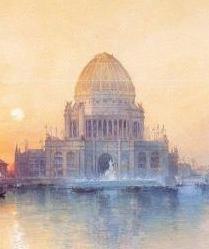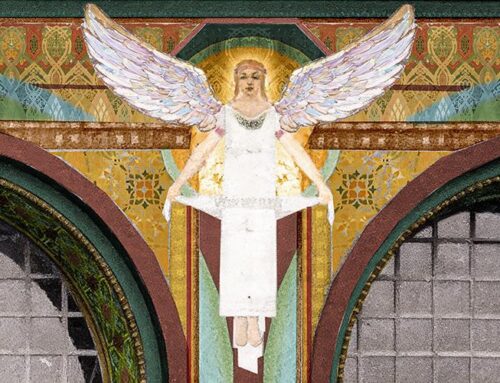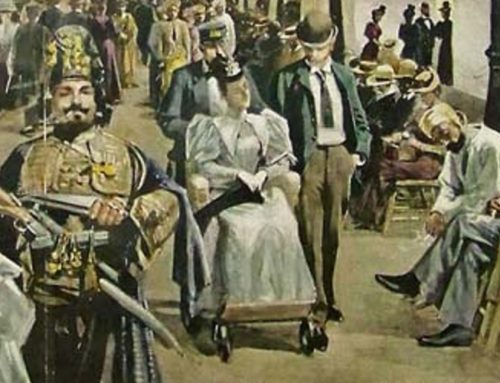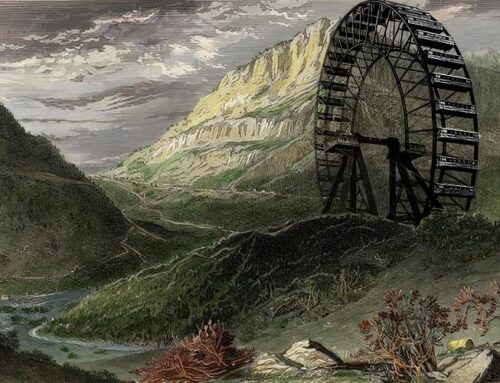
“The bigger Chicago is, the more important this world becomes.”
—Charles Dudley Warner
American essayist and novelist Charles Dudley Warner (1829–1900) is perhaps best remembered as the co-author with Mark Twain of The Gilded Age: A Tale of Today. Their 1873 novel satirizes the greed and political corruption endemic in the United States after the Civil War. The “Gilded Age” moniker eventually came to describe the era of excess and deception in late-nineteenth-century America.
The pinnacle of Gilded Age Chicago was the World’s Columbian Exposition, a White City on the lake adorned with gilded domes and a glittering colossus that were illusions made of plaster.
Although Samuel L. Clemens came to Chicago twice in 1893, he missed the great Fair both times. During his visit in mid-April, he was confined to his hotel room for eleven days due to illness and never saw the Exposition grounds as it was being readied for its May 1 official opening. While returning for a one-day business trip just before Christmas, Clemens made a quick visit to the former fairgrounds to see the shuttered Court of Honor. The raconteur never shared his impressions of the White City with his readers.
Charles Dudley Warner, on the other hand, visited the 1893 World’s Fair for an extended stay and had much to say about it.

This creation of beauty and splendor
Even before attending the 1893 World’s Columbian Exposition, Warner was inspired by the promise of the White City in Chicago. He was a special guest at banquet held honoring Director of Works Daniel Burnham held on March 25, 1893, at the Madison Square Concert Hall in New York. Seated at the main table with the presiding host, architect Richard Morris Hunt, Warner offered the distinguished guests a toast to “Columbus.”
In late June, Charles Dudley Warner traveled from his home in Hartford, Connecticut, to attend the World’s Fair in Chicago. He was serving as an organizer and presenter at the Congress of Authors, which ran from July 10–17 as one part of the Literature Department of the World’s Congress Auxiliary.
At an opening reception held on the evening of July 10, Warner offered remarks paying tribute to the beauties of the World’s Fair and stating that the fairgrounds surpassed the grandeur of ancient Greece or Rome and doubting whether anybody except a second St. John could describe the glory of the White City. [“Literary Men Meet”]
“I fear all the time that the Fair will disappear, and I grudge every moment spent away from it, for it will go, like everything else that we have created by hand. And when it has gone these poor scribblers who have not money enough to create it, and many of them not imagination enough to put it into poetry or into romance even—because I don’t know anybody, except St. John in the Apocalypse, who has hit it off at all so far—these poor scribblers will have to take up the task of perpetuating this creation of beauty and of splendor, and the next generation that wanders about Lake Michigan looking at the ruins of Chicago—the distant generation, of course—will have to depend upon some wandering bard, who even then won’t be half paid, I dare say, for the remembrance, for the description of the great achievement of this city of Chicago in 1893.” [Johnson, 161]
.
“It did not seem possible that anything so beautiful was securely anchored to the earth,” he pondered when visiting the fairgrounds during his stay in Chicago. [“Everybody’s Week”] He reportedly entered the White City each morning with a fear that it may have vanished during the previous night.
At a session on July 13, Warner presented his paper The Function of Literary Criticism in the United States, which “spoke many wholesome truths, though handling somewhat roughly the literature of the United States” according to historian Hubert Howe Bancroft. [Bancroft, 934.]

A vision of wonderful beauty
Before returning home to Hartford, Warner penned this effusive correspondence to the Courant newspaper, of which he was editor and part owner, praising the Exposition in Chicago:
If any word I could write would induce anyone to visit the World’s Fair at Chicago I would put it in italics. It is worth any reasonable sacrifice of money and time. Better economize in other ways than to miss an experience which will be food for the thought of all after years. There has, I am sure, been no spectacle equal to it before and there will be nothing like it in our generation.
Probably the nearest approach to it in architectural beauty was the Rome of the Cæsars, but the splendor of this city palaces on a lagoon today has elements of beauty that were lacking at the Via Sacra, with the Capitol at one end and the Colosseum at the other. We have here the effect of water, which reminds us of Venice, and we have the witchery of electric lights, which for the first time in history have been used to illuminate such a noble scene.
The marvel of it is that an industrial exhibition is at the same time a vision of wonderful beauty. No language can do justice to it. I am not going to use adjectives, and I am not going to repeat descriptions with which the readers of the Courant are already familiar. The Fair is great success, both in its exhibits and in the attendance. It will be able to pay it floating debts and I think that the money Congress voted to it, but it will not return to the Chicago stockholders the millions (about nine) that they have put into it. It is an American affair, and it is Chicago and not Congress that has saved the national honor. The government has put up its own building, and it was expected that it would pay the awards. But is has deducted the money for them from the $2,500,000 that it voted to give the Fair in silver half dollars. Nothing in our history has so redounded to the credit of America as the artistic creation at Jackson Park, but Congress has been niggardly throughout. The honor goes to Chicago and to the States which are represented there by their own beautiful State buildings.
The location of the Fair was most fortunate. In no other great city of the country could this wonderful creation been possible; no other city could offer a situation or a climate so favorable for a summer exhibition. The air is generally exhilarating and stimulating on the lake shore, and, although there have been some hot days there, the heat is nothing to that of inland cities, and cool, bracing weather alternates with the hot days, always coming with a breeze from the lake. The weather all June and the first half of July was superb, stimulating to exertion, and yet soft and balmy at night.
The facilities of transportation are unrivaled from all directions; probably never before could so many people be so safely handled in an hour. The steamers from Van Buren street carry crowds, the big whaleback can take 5,000 at a time, and then there is the flying express, which goes down, every few minutes, in fifteen minutes, the suburban trains also on the lake shore, the elevated road, and several cable lines. There are also in the city and at the Fair an abundance of hotel accommodations of grades to suit all persons, and I have heard of scarcely any exorbitant charges.
To one who studies the Fair two things are special causes of wonder. One is that this marvelous thing could have been erected in the short time it was erected in. It is safe to say that no other nation could have done it—and it is safe to say that no other community in all history except the Chicago community could have done it. In no other city in the United States is there the requisite public spirit, generosity, and headlong energy. I think that this is perhaps the greatest exhibition that America makes at the Fair. It is an achievement, so far as I know, unparalleled. If it were a failure it would still command our admiration for its audacity ands generosity, but as it is a great artistic and industrial success it is a subject for national jubilation and gratitude.
The other wonderful thing is the mind that is put into the conception of the scheme and the administrative detail with which it is carried out. Nothing seems to have been neglected. The more we study the details of administration in any branch the more we are impressed with this. For the workmen in this splendid city the night must be busy as the day. All the supplies are taken in after 11 o’clock at night. All the refuse is then gathered and taken to the crematories to be burned. During the day from 50,000 to 200,000 people (on special days more) are transported there, are carried about by the boats and chairs and the intramural rail, are fed, looked after by the ambulances and the hospitals, guarded, protected, and amused, and leave everywhere the litter of their lunch baskets. And every morning the city is spick and clean again. We are greatly impressed by the mind that conceived this splendid city of the lagoon, that made it so harmonious, that decorated it with statuary, and adorned it with native and exotic plants, but after all the administrative detail excites fully as much wonder.
Never before was such variety of entertainment offered at one time and place. To pass by the exhibits themselves, which one cannot walk through and glance at in less than a month, and the scene at night when the buildings are illuminated and the many-colored electric fountains are playing, and the floating about in this fairy land in the electric launches and gondolas, there is the great variety of races on exhibition. Paris probably had a great variety of Oriental people, but ours is a greater world spectacle. We have here the Esquimaux, several tribes of our own Indians, and Mexicans and South Americans. To them we add the South Sea Island Colony. These latter contrast in their barbarous dances with the colony from Dahomey. The Orient is also here in force, the Chinese and Japanese with theaters and tea-houses, the Persians with theaters and dances, the Turks, the Egyptians, the East Indians, the Ceylonese, the Javanese (with the most interesting village, theater, and orchestra on the grounds), and all sorts of acrobats, dancing girls, and merrymakers from strange lands. Then Europe has put itself here bodily in Irish villages, German villages, a complete reproduction of Old Vienna of the fifteenth century, and so on and so on. There is also music to be heard everywhere, and from some of the best bands in the world.
There is no space to speak of the educational value of the exhibitions, aside from the industries and inventions. Everywhere are young women with their note-books. What an educator to them are the picture galleries and the concerts. Thomas has an orchestra of 114 pieces, heard every day. It is best I ever heard. I believe it to be the best in the world today.
There is one other matter which I will only allude to. It is the bitter feeling all through the West in regard to New York. The conduct of most New York newspapers has created a feeling in regard to New York which is unfortunate, and is certain to show itself when New York wants anything from the Nation. Its ill-effect has been pretty much overcome so far as the country at large is concerned, but it is believed that the New York press has kept away foreign visitors. New York lost the Fair because Pennsylvania resented the New York press’ treatment of the constitutional celebration at Philadelphia in 1889, and I heard many business-men say that New York would be made to feel the effects of the unpatriotic hostility of its press to Chicago. Of course much of this bitterness will subside in the general success of the Fair, but it is most unfortunate, for no two cities are so tied together by commercial necessities as Chicago and New York.
Mr. Abram S. Hewitt’s comments in the New York Post did a good deal to soften this feeling. And gradually the false impression about the Fair in Europe is being removed. The letter of Lessing, the great art director and critic, to a Berlin paper, was a finer acknowledgement of the artistic beauty of the Fair than has appeared elsewhere. The fact is that the Fair is most highly appreciated by those who have traveled most and are most highly educated.
Appreciation of it must constantly grow. It is fairly the eighth wonder of the world, and those who fail to see it will be most unfortunate.
Warner’s generous praise of Chicago in the last section of his letter served as a strong antidote to the poisonous diatribe penned two month earlier by Charles Dana in his New York Sun [See “Charles Dana’s 1892 Roast of Chicago“]. Praise of Chicago’s weather earlier in the piece is ironic coming from the author who originated the quote “Everybody talks about the weather, but nobody does anything about it.”

“It did not seem possible that anything so beautiful was securely anchored to the earth.” —Charles Dudley Warner
A noble combination of architecture and landscape
On October 28, 1893, Warner was back in Chicago as a guest of honor at a banquet of the Commercial Club (an organization still in existence today). In his speech, Warner made a strong plea for Chicago to try to preserve in permeant form the beauty of the Fair, with its noble combination of architecture and landscape. A Chicago reporter noted that Warner declared that Chicago “make itself at once unique and beautiful, so fair that people would come from all parts of the world to see what we have. People should then know that they can come here and see beautiful, original architecture in our parks.” [“Ended the Feast”] (Perhaps Warner would be delighted that in 2021, Time Out Index survey voters from across the globe voted Chicago the second most beautiful city in the world.)
What should have been a festive meeting to celebrate the imminent closing of the Columbian Exposition (scheduled for October 30) was cut short when attendees gathered at the Grand Pacific Hotel received the shocking news that Mayor Carter Harrison had been shot and killed.

“Why cannot another city be as decently governed and have as good sanitary conditions?” —Charles Dudley Warner
An ideal of Beauty never before created
After the conclusion of the Fair, The Critic invited many notable commentators to briefly answer the question “What most impressed you at the World’s Fair?” [“Impressions of the World’s Fair”] Warner listed these four:
1. An ideal of Beauty never before created in a square mile on this earth. This ideal must strongly and permanently affect the nation.
2. The uniform good order, good humor, and civility of the visitors. A great feather in the cap of the Republic.
3. The example of administrative ability, of order, of honesty, of cleanliness, in a big city over-run by crowds. Take an illustration: Every night all the refuse removed and consumed in a cremator, close to the ground, without a single unpleasant reminder. Why cannot another city be as decently governed and have as good sanitary conditions?
4. The exhibits. As I had only about three weeks at the Fair, in three visits, I had not time to see much of the exhibits.

“the scene at night when the buildings are illuminated and the many-colored electric fountains are playing, and the floating about in this fairy land in the electric launches and gondolas…” —Charles Dudley Warner
SOURCES
Bancroft, Hubert Howe The Book of the Fair. The Bancroft Company, 1893.
“The Dinner to Mr. Burnham” The Critic Apr. 1, 1893, p. 202.
“Ended the Feast” Chicago Inter Ocean Oct. 29, 1893, p. 8.
“Everybody’s Week” Chicago Inter Ocean Oct. 23, 1893, p. 6.
“Impressions of the World’s Fair” The Critic, Nov. 25, 1893, pp. 331-334.
Johnson, Rossiter A History of the World’s Columbian Exposition Volume 4 – Congresses. D. Appleton and Co., 1898.
“Literary Men Meet” Chicago Inter Ocean, July 12, 1893, p. 3.
Warner, Charles Dudley “Some Aspects of the Fair” Hartford (CT) Courant July 20, 1893, p. 6.






Leave A Comment